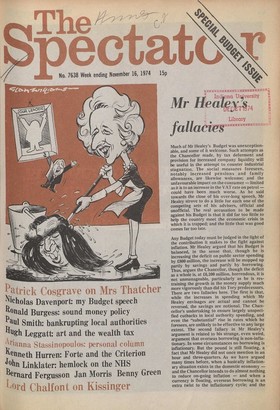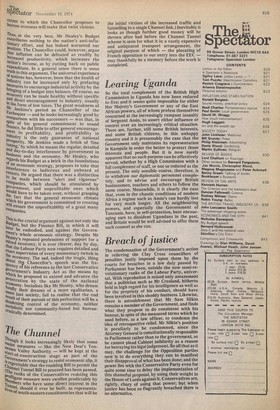Much of Mr Healey's Budget was unexceptionable, and some of
it welcome. Such attempts as the Chancellor made, by tax deferment and provision for increased company liquidity will be useful in the attempt to counter industrial stagnation. The social measures foreseen, notably increased pensions and family allowances, are likewise welcome; and the unfavourable impact on the consumer — limited as it is to an increase in the VAT rate on petrol — could have been much worse. As he said towards the close of his over-long speech, Mr Healey strove to do a little for each one of the competing sets of his advisers, official and unofficial. The real accusation to be made against his Budget is that it did far too little to help the country meet the economic crisis in which it is trapped; and the little that was good comes far too late.
Any Budget today must be judged in the light of the contribution it makes to the fight against inflation. Mr Healey argued that his Budget is balanced, in the sense that, though he is increasing the deficit on public sector spending by £800 million, the increase will be mopped up partly by savings and partly by borrowing. Thus, argues the Chancellor, though the deficit as a whole is, at £6,300 million, horrendous, it is not unmanageable, particularly as he is restraining the growth in the money supply much more vigorously than did his Tory predecessors. There are two fallacies here. The first is that, while the increases in spending which Mr Healey envisages are actual and cannot be reversed, the savings are notional. The Chancellor's undertaking to ensure largely unspecified cutbacks in local authority spending, and even the "substantial" rise in rates which he foresees, are unlikely to be effective to any large extent. The second fallacy in Mr Healey's argument is related to his strange, even weird, argument that overseas borrowing is non-inflationary. In some circumstances no borrowing is inflationary. But the pound is still floating, a fact that Mr Healey did not once mention in an hour and three-quarters. As we have argued many times before, when a basically inflationary situation exists in the domestic economy — and the Chancellor intends to do almost nothing to reduce on-going inflation — and when a currency is floating, overseas borrowing is an extra twist to the inflationary cycle; and the Tints, at the very best, Mr Healey's Budget contributes nothing to the nation's anti-inflationary effort, and has indeed worsened our Position. The Chancellor could, however, argue that inflation can be defeated as readily by increased productivity, which increases the nation's income, as by cutting back on public expenditure. In a general sense there is some truth in this argument. The universal experience of nations has, however, been that the health of industry can be increased only by prefacing !neasures to encourage industrial activity by the bringing of a budget into balance. Of course, no ectInotny can be made healthy without specific .and direct encouragement to industry, usually In the form of low taxes. The great weakness of IVI,r Jenkins's period as Chancellor of the txchequer — and he looks increasingly good by comparison with his successors — was that, in isPite of his general commitment to sound inance, he did little to offer general encourage !tient to profitability, and profitability in ;nth, sLry is the only guarantee of national ProsPerity. Mr Jenkins made a fetish of 'fine tuning,' by which he means the regular, detailed 2-nd day-to-day interference by government in unsiness and the economy. Mr Healey, who regards his Budget as a brick in the foundations an economic strategy, proposes to take that Interference to ludicrous and unheard of !xtents. He argued that there was a distinction tO be made between "alert and vigorous" Companies, which should be stimulated by government, and unprofitable ones which ,W°1-11d have to be taken over, without grasping ute fact that the general economic climate WhiCh his government is committed to creating will ensure the unprofitability of a great many c°InPanies.
Inis is the crucial argument against not only the u,ndget, but the Finance Bill, in which it will 'ter be embodied, and against the Govern117ent's whole economic strategy. Despite Mr „.caleY's repeated professions of support for a d economy, it is ever clearer, day by day, ethat the Labour Party now requires detailed and 4ret supervn of every momentary twitch in e economy. The sad, indeed the tragic, thing about 01_9 Chancellor's speech was the frecluencV of his reference to the last Conservative government's Industry Act as the means by which he proposed to extend and advance the Penetration by the state of the national r,,Qn.,cony. Socialists like Mr Healey, who dream -11°1Y their dreams of a more egalitarian, a more •
, lust society, fail to realise that the end
,7sult of their pursuit of this perfection will be a sueadening control of the economy, neither °cialistic nor community-based but bureaucratically determined.



































 Previous page
Previous page